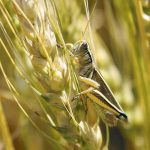It’s been another bad year for grasshoppers in many parts of the Prairies. Some farmers have told us that whatever crop managed to grow in this summer’s drought was eaten by the voracious insects. The problem isn’t new, of course. Histories of the early days of farming on the prairie, particularly in the United States […] Read more
Tag Archives grasshoppers
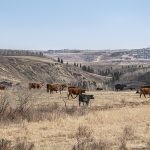
Livestock producers call for more drought help
Sask. crop insurance doubles low-yield thresholds to allow crops to be used for feed, but farm group says more is needed
The Saskatchewan Stock Growers Association called for an immediate AgriRecovery assessment last week, even as governments moved to make it easier to turn low-yielding crops over for feed. President Garner Deobald said the steps taken so far, such as potential rent reductions on crown pasture, are helpful but don’t go far enough. Implementing AgriRecovery could […] Read more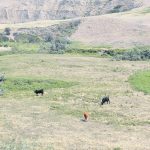
Rural municipalities declare ag disaster in Alta.
More counties are expected to make the declaration as the impact of extremely dry weather continues to affect producers
A swath of Alberta continues to experience extremely dry conditions during what is traditionally the wettest time of year. Rainfall hasn’t fallen at all along an area of the southern portion of the province since the beginning of June. Except for the Eastern Slopes of the Rocky Mountains and parts of the Milk River basin […] Read more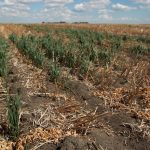
Sask. farmers can move poor crops to livestock feed
Low-yielding cereal and pulse crops can be diverted for livestock feed, the Saskatchewan Crop Insurance Corp. and Agriculture Canada announced July 12. The corporation is doubling low-yield appraisal values so that farmers can make decisions about their poor crops and support livestock producers who need feed. Pockets of the province are again experiencing severe drought […] Read more
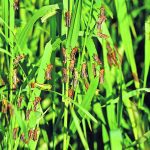
Grasshoppers out early
Farmers are urged to make sure they are dealing with a pest variety of hopper before they decide to spray.
“The good news is if you have millions you don’t have to know (which species),” said Dan Johnson from the University of Lethbridge. “If you have millions, they are definitely pests. None of the naturally occurring ones out on the rangeland that feed birds and participate in the ecosystem ever form millions.”
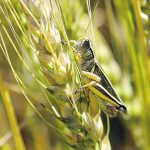
Recent snow not expected to hit grasshoppers
Soil likely wasn’t warm enough for the insects to be active when a widespread storm blanketed much of the Prairies
The weather conditions over the next four to six weeks will ultimately determine grasshopper populations said Prairie Pest Monitoring Network scientist and Agriculture Canada entomology expert Meghan Vankosky.
